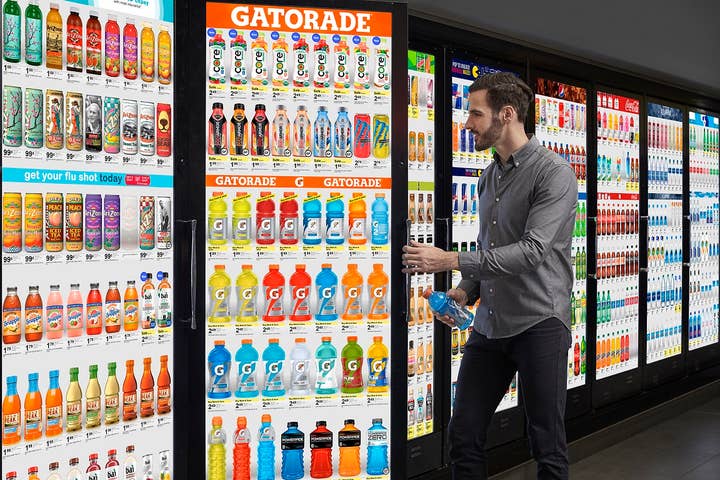Disgraceful degradation | This Week in Business
A Stop Killing Games petition draws a response from UK Parliament and grocery store coolers with TV screens give us a metaphor for the games industry
This Week in Business is our weekly recap column, a collection of stats and quotes from recent stories presented with a dash of opinion (sometimes more than a dash) and intended to shed light on various trends. Check every Friday for a new entry.
This week, we reported on the UK government's response to a petition from Stop Killing Games, a grassroots campaign organized by YouTuber Ross Scott that's trying to get publishers to, well, stop killing games.
Specifically, the campaign wants to make sure that games like The Crew, which Ubisoft effectively snuffed from existence when it shut down the online servers in March, are preserved not just for the customers who paid money for them but for future generations as well.
And while nobody's asking companies to continue supporting online games forever at their own expense, Stop Killing Games would like to see publishers required to do more than they are currently. Or at the very least, force them to clearly commit to supporting a game through a specific date when they sell it, and include that expiration date on the packaging and other marketing materials. (This was the same course of action we advocated for when we addressed the topic in this space in January.)
The UK petition – which is still available to be signed – is focused less on the expiration date and more on publishers basically not being jerks about it when they drop support for a game.
QUOTE | "Require publishers to leave videogames (and related game assets / features) they have sold to customers in a reasonably working state when support ends, so that no further intervention whatsoever is necessary for the game to function, as a statutory consumer right." – What the Stop Killing Games petition asks for.
The government has already responded, and its response is not terribly encouraging. It starts off by saying there's no law saying companies have to support older versions of software, and adds that running servers for old games with declining user bases can be expensive. It then notes that publishers still need to follow existing consumer rights laws.
QUOTE | "The [2008 Consumer Protection from Unfair Trading Regulations] require information to consumers to be clear and correct, and prohibit commercial practices which through false information or misleading omissions cause the average consumer to make a different choice, for example, to purchase goods or services they would not otherwise have purchased." – The UK government explains what publishers need to be mindful of when it comes to server shutdowns.
That reads to me like the government believes current industry practices are fine, and as long as a game has a note about an "internet connection required" or something on the package – as The Crew did – that's probably good enough.
Keep in mind I'm not a lawyer and don't live in the UK. And while I have worked with a number of UK citizens over the years, when I send them several thousand words about innovations in grocery store refrigerators for proofreading and they reply back that it was "interesting," I still take it as a compliment. I should probably not be trusted to understand the English language when it's being used by the actual English.

Even so, there's another bit in the government response to reinforce my interpretation.
QUOTE | "If consumers are led to believe that a game will remain playable indefinitely for certain systems, despite the end of physical support, the CPRs may require that the game remains technically feasible (for example, available offline) to play under those circumstances."
Publishers benefit tremendously from the erosion of ownership and ongoing support we've seen in the industry for decades now.
So long as publishers don't foster an expectation that the game will be playable forever before pulling the plug, there's no problem. That's a pretty low bar for them to clear, and it means the publishers benefit tremendously from the erosion of ownership and ongoing support we've seen in the industry for decades now.
If someone sold an Atari 2600 game in the early 1980s and every cartridge sold was designed to become unplayable six months after purchase, you can bet consumer rights laws would have applied there because players would have assumed they would have permanent access because that was basically the only way people understood games existing at the time. The customer would have been led to believe in the game's continued playability the same way they were led to believe in object permanence as a baby.
But games have routinely seen servers for multiplayer modes go dark for years now, and they've been joined by plenty of free-to-play mobile games and MMOs being shut down entirety.
Publishers like Ubisoft have taken advantage of that by producing games that should belong in the former category – a game that loses its multiplayer functionality when the servers get shut down – and move them to the latter category – a game that does not exist without servers.
After all, the limited resource publishers are fighting over in a games-as-a-service world is players' time, so it's not in a company's interest to let customers spend their time playing an older game that does not provide a continuous stream of money, especially when it would rather those old players pony up again for newer games built around current best practices for maximized monetization.
QUOTE | "The Crew Motorfest continues to outperform The Crew 2 on acquisition, activity, monetization and net bookings metrics on a comparable basis since launch thanks to its quality seasonal, monthly and weekly activities. The franchise quadrupled its net bookings year-on-year, leading to record net bookings." – In its earnings report this week, Ubisoft this week touted the tremendous performance of the recently released The Crew Motorfest during the same quarter it shut down the servers for The Crew.
I will concede that The Crew sunsetting is pretty far down on the list of reasons Motorfest is doing well. But it doesn't really matter where on that list it is, because as we established the last time we talked about this, the game runs locally off the disc just fine. Ubisoft placed an unnecessary limitation on a product that consumers bought. It is financially incentivized to place this kind of limitations on all of its games going forward, and is doing so with Star Wars Outlaws and Assassin's Creed Shadows, two single-player games whose physical copies will require online connections in order to install them.
If publishers were pursuing a future driven by planned obsolescence, would their behavior right now be any different?
Let's assume the worst for now and say that evil, greedy publishers are trying to push the gaming business into one of purely planned obsolescence, where customers have to constantly fork over more money to them or be denied the ability to enjoy their purchases. If that were the end goal, would their behavior right now be any different?
They have pushed and prodded the industry in this direction for years, ocassionally overstepping and drawing backlash as with the always-online SimCity or the Xbox One's original restrictions on used games, but never waiting too long before resuming the push for ever-greater control over the gaming experience, control that coincidentally happens to restrain what players can do with games they purchase.
If the law as it stands currently allows for such a plan to effectively undermine consumer rights, maybe the law needs to be changed.
As of this writing, the Stop Killing Games petition has more than 23,000 signatures. If it can make it to 100,000 signatures by October 16, it will be considered for debate in Parliament.
Stop Killing Games has also initiated similar petitions in Australia (where the deadline to sign is this coming Monday) and Canada (where signatures can be collected until the morning of September 5).
Letting Cooler-heads prevail
Bear with me for a minute while I talk about Cooler Screens.
If you've never seen these before, they're basically the coolers from a grocery store refrigerated or frozen food section, but with the glass door replaced by a TV monitor showing pictures of the products inside.
Why would a customer want a TV monitor instead of a glass door on its coolers? Let's ask Cooler Screens.
QUOTE | "The consumer is our inspiration. We create an experience that engages hearts and minds. We connect with people emotionally and inform them intellectually, sparking curiosity and rewarding them in the moment." [All emphasis in original] – The official Cooler Screens website, getting a bit grandiose in its mission to show people what's in the cooler section, but in a slightly different way than glass doors did.

But surely there's more? Ah yes, here's the Cooler Screens FAQ, which as promised contains what must be the single most frequently asked question about Cooler Screens.
QUOTE | "How is the Cooler Screens experience a better shopping experience for me or for others?"
Great, exactly what we're looking for. Now to read just a little bit further to find the answer…
QUOTE | "Cooler Screens is a better shopping experience."
Oh, well OK then.
"Cooler Screens is a better shopping experience"Cooler Screens
In all fairness, it also says Cooler Screens "bring shopping ease, relevance, and transparency," but it's not like glass made shopping difficult or showed you irrelevant things. As for that last one, how are you going to compete on transparency with glass? It's glass, for cryin' out loud!
I fail to see how Cooler Screens are an improvement in any way, but that might just be a "me" problem. After all, Cooler Screens says it paid for studies that showed that 90% of consumers did not prefer the traditional glass cooler doors, from which it jumps to the conclusion of people "confirming a strong preference" instead of confirming that people don't give a flying Beef Merlot Café Steamer about what tech the door uses; they just want to see what their options are.
I'm not ruling out the idea that some people prefer Cooler Screens. We're more used to seeing screens when we eat TV dinners than when we buy them, so perhaps it just feels like a fancier shopping experience, like that one grocery store I went to as a kid that had a talking soda vending machine. For an eight-year-old kid, that thing was certifiably neato, and I was definitely asking my parents to let get me a Coke whenever we went there just to hear the computerized voice tell me how much money I had put in with each coin.
But there are very few stores that would think it's worth investing in such an expensive thing just for the neato factor and a few extra purchases from kids nagging their parents, so of course there's a different pitch for the retailers that install these. For them, Cooler Screens notes that there are cameras and sensors on the coolers, and it promises "AI-driven merchandising" and "interactive experiences" that are "guided by real-time connected data and signals from consumer interactions."
Yup, it's ads. Just ads.
In some cases, a truly absurd amount of ads. And when those ads are playing, customers of course can't see what's actually inside the cooler.
Once again, a start-up company has been inspired to move the world a few steps closer to a sci-fi film dystopia (Idiocracy or Minority Report, take your pick) in the name of finding yet another crevice of our lives to cram full to bursting with advertising.

The whole thing is awful and gross, but why are we talking about it on a video game site? Well as I see it, Cooler Screens have a lot in common with the games industry of late.
Much like the generally underwhelming features publishers use to justify superfluous always-online requirements, Cooler Screens are something technologically novel that might intrigue consumers, but offer them very modest benefits in reality. However, the benefits to the companies shoehorning such requirements into games are considerably greater.
They gain control over the play experience that they formerly had to give up back when customers could actually own things. They gain additional insight into how people play their games, which can absolutely be used to improve the player experience, but in a games-as-a-service world that insight is more likely to applied to optimize for monetization and engagement instead of actual player enjoyment. And of course, they get to serve constantly updated ads, either for outside products or for their own add-ons and pricing promotions.
Sometimes companies don't even bother to make an argument as to how adding burdens to the player experience is ultimately beneficial, such as Sony's ill-advised attempts to mandate PlayStation Network accounts for the PC versions of Helldivers 2, Facebook disabling Oculus headsets unless their owners created a Facebook account (and deleting your Oculus purchases if you ever decided to delete your Facebook account), or Nintendo bricking their customers' Wii U systems until they agreed to a new end-user licensing agreement.
Throw in the aforementioned connectivity requirements for both software and hardware and it's not hard to see how publishers have consistently pushed over the years in search of an ever-increasing amount of control over the user experience and more palatable forms of DRM. (Depending on your assessment of kernal-level anti-cheat systems, perhaps they can be included here as another example of publisher over-reach.)

Almost all of these moves offer some nominal benefit to the end user, but considerably greater benefit (and control) to the game publisher. It's much the same with blockchain, augmented reality, and other such hyped new tech that comes with flashy promises and possibly a neat tech demo, but offers few explanations for why their way of doing things is fundamentally better than what can be achieved with existing tech. A lot of the current wave of AI hype belongs in here too. These innovations can all be eye-catching, at least until the novelty wears off, but they often fall woefully short when it comes to articulating concrete, practical and compelling benefits for the end user.
And it's not just that they don't have compelling benefits; in many cases, they have significant drawbacks that companies simply don't bother accounting for.
QUOTE | "I like an escalator, man, because an escalator can never break. It can only become stairs." – Mitch Hedburg
That basic idea is the concept of graceful degradation, designing things in such a way that when various bits stop working, users can still use it for other purposes that weren't entirely reliant on those bits. In some ways, video games are pretty good at this. Most of those aforementioned dead multiplayer modes will give users a "server could not be reached" message after a certain amount of time and let them go back to enjoying the rest of the game. And entire fields like QA and speedrunning are predicated on things in software not going as the designers intended while the remaining parts truck on regardless.
In other ways, video games are terrible at this. And not just garden variety terrible, but Cooler Screens terrible.
So what happens when a Cooler Screen breaks?

The picture above was posted a few months ago by Reddit user Chriscuits, who explained that employees in the store printed out pictures of the coolers' contents and taped them to the broken monitors. Thankfully, you can still see enough of that PlayStation ad to know this terrible customer experience was brought to you in part by Sony. Much appreciated, Sony!
And it should be noted that situations like the one above giving your store a real Keystone Cops vibe are among the less drastic ways these things can break.
QUOTE | "The doors' digital screens regularly froze or went dark, preventing customers from seeing what was available inside, and some even sparked and caught fire, according to the court documents." – The Wall Street Journal recaps Walgreens' complaints about Cooler Screens in an ongoing legal battle with the company over a botched rollout of the TV doors in the pharmacy chain's grocery sections.
Sure, adding monitors to cooler doors lets you show ads in novel ways, but it also adds a whole bunch of new (and potentially quite harmful ways) things can break and go wrong, and at much greater cost than the glass doors they were replacing. So when they do break – and given the technology involved, it's going to happen a heck of a lot more than with glass doors – they have a considerably worse impact on the user experience.
Cooler Screens are the opposite of graceful degradation, and a philosophical match to a lot of the game industry's push towards online functionality
I'm not even talking about setting-people-on-fire bad (although lest it go unsaid, that qualifies as a very bad user experience). If the measures Cooler Screens want to be judged on are shopping ease, relevance, and transparency, then a screen on the fritz makes the shopping experience harder because it's showing less relevant information (or none at all), and that borked monitor is not at all transparent.
That's the opposite of graceful degradation, and it's a philosophical match to a lot of the game industry's push towards online functionality as a means of erasing player ownership.
The games industry is designing fragility into its products at a fundamental level, largely because it shares the same idea of transparency as Cooler Screens: Transparency isn't about letting people see what's really there, it's about showing them the version of what's really there that you're willing to let them see.
The rest of the week in review
STAT | 370% - After closing last week's trading at $17.46, GameStop shares were trading at almost four times that price this week because one of the posters who sparked the 2021 meme stock rally started posting memes again after a multi-year break.
QUOTE | "From February 4, 2024 to May 16, 2024, the closing price of our common stock on the NYSE ranged from as low as $10.01 to as high as $48.75 and daily trading volume ranged from approximately 1,731,300 to 206,979,100 shares. During such period, we did not experience any material changes in our financial condition or results of operations that would explain such price volatility or trading volume.
"Furthermore, since January 2021 through the date hereof, the market price of our common stock has seen extreme price fluctuations that do not appear to be based on the underlying fundamentals of our business or results of operations. Investors that purchase shares of our common stock in this offering may lose a significant portion of their investments if the price of our common stock subsequently declines." – In creating up to 45 million shares to sell to take advantage of the rally this morning, GameStop admits there was absolutely no reason for it to be trading that high and anyone who buys these shares should be prepared to lose their shirts.
STAT | $20.86 – GameStop's share price as of Friday morning. The retailer acted quickly to take advantage of the surge, but maybe not quickly enough.
STAT | $2.35 billion – With Grand Theft Auto now expected in fall of 2025, Take-Two lowered its expectations for the current fiscal year (ending in March of 2025) by at least $2.35 billion. It previously had said it expected bookings of $8 billion.
QUOTE | "We didn't shutter those studios, to be clear." – In an interview with IGN, Take-Two CEO Strauss Zelnick said the company didn't shutter Roll7 and Intercept Games, two studios that were reportedly shuttered earlier this month. When IGN senior reporter Rebekah Valentine followed up to ask if those studios still existed then, a company representative interjected and said Take-Two would not be providing additional information.
Ah, sweet clarity!
STAT | Unknown – Square Enix staff were reportedly informed that the publisher would be laying off an unknown number of workers from its North American and European operations over the next month. The company said in its quarterly earnings report this week that it would be taking a new strategy to its AAA console and PC game category that would be more multiplatform.
This week also saw layoffs reported at Mighty Kingdom, Singularity 6, Phoenix Labs (which was also acquired by a blockchain company at some point in the past year?!), and event organizer Player1, which has seemingly put the long-running Insomnia Gaming Festival to bed.
Obviously, the layoffs are grim, but we're starting to see more stories of new studios launching, including – frustratingly – from companies that just got done laying people off. Microsoft laid off 1,900 people in January and shut down a few Bethesda studios earlier this month, but this week its Activision division announced the creation of Elsewhere Entertainment, a Polish studio creating new IP. You know, like Arkane Austin and Tango Gameworks used to do.
And then there's Sony, which laid off 900 PlayStation employees in February. This week saw reports that they've formed a new studio with a chunk of the team from its recently closed partner developer Deviation Games.
QUOTE | "I am thrilled to lead the studio business group and continue to build on our success with PlayStation 5, while preparing for the future." – In taking over some of the responsibilities of former PlayStation CEO Jim Ryan, newly named PlayStation Studio Business Group CEO Hermen Hulst explains that he will be the person to yell at when it comes to software. The Platform Business Group CEO Hideaki Nishino is taking on Ryan's other duties and will be the person to yell at about hardware.
STAT | €2.32 billion ($2.52 billion) – Ubisoft's net bookings for the year ended March 31, an increase of 34% year-over-year and a new record high for the company, which celebrated the successful year with another round of layoffs last month.
QUOTE | "Sometimes technology appears and it's super useful, and you understand. Like Chat GPT shows up one day and everyone just f***ing gets it." – In explaining why it's taking so long for VR to catch on with mainstream audiences, Owlchemy Labs CEO Andrew Eiche shows he may not be the best judge of what is "super useful." Or the best judge of things "everyone just f***ing gets," for that matter.
QUOTE | "Inappropriate and misleading" – Netease describes the terms it put into a contract with streamers where they would get access to the Marvel Rivals playtest on the condition that they not say anything bad about it. The company said it is working on revising its contract.
QUOTE | "Some people blink and say, 'I thought this conversation was going to go differently.'" – Midsummer Studios co-founder Jake Solomon describes the reaction from would-be investors who took a meeting with the former creative director of XCOM and are told he wanted money to make a modern life sim studio.
QUOTE | "We're excited to see what the creators will do with [Lego UEFN tools] because they're going to do things that we hadn't thought of ourselves." – Lego's game division head of play and creator growth Kari Vinther Nielsen talks up the potential for the Unreal Editor for Fortnite.
STAT | €1,125,000 - The Netherlands Authority for Consumers and Markets has fined Epic Games €1,125,000 for using "unfair commercial practices" aimed at children in Fortnite, which is a drop in the bucket next to the $520 million Epic paid to settle FTC charges of violating children's privacy laws and using dark patterns in Fortnite.
If I were Lego, I might not be so eager to see what's done with Lego Fortnite that Lego would never have thought to do itself.

